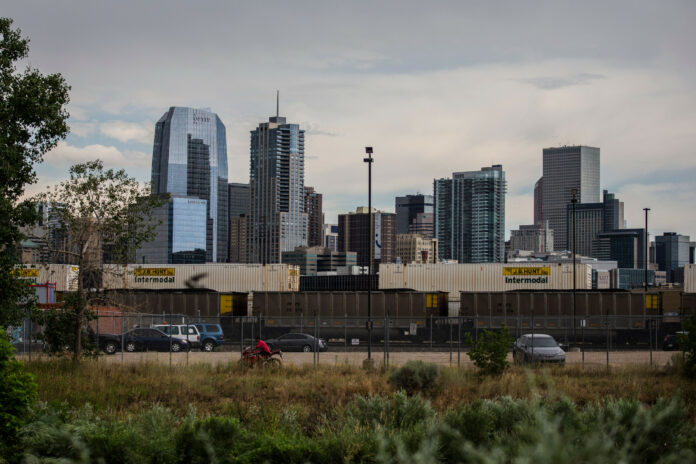Migrants and a local advocacy group in Denver protested the city’s new Asylum Seekers Program that provides some short-term alleviation, saying it doesn’t go far enough.
Last week, Denver Mayor Mike Johnston announced what was described as “the first step” in a long-term, sustainable response to what has been dubbed a crisis that has caused city officials to examine negative impact to city services.
The city is welcoming roughly 1,000 people into the city’s newcomer shelter system, all of whom are potential asylum seekers who must wait at least 180 days after applying for asylum to receive work authorization. They are also being provided six months of housing assistance, in-depth workforce training and food assistance while they await legal work authorization.
“The city continues to work closely with nonprofit partners to ensure newcomers have a long-term plan to avoid eviction,” Jordan Fuja, Johnston’s press secretary, told Newsweek.
CHET STRANGE/AFP via Getty Images
A group of migrants and the advocacy group Housekeys Action Network Denver (HAND) held a protest in the city on Sunday, notably regarding the change in shelter rules for length of stay. Migrants have been staying in shelters between 14 and 42 days, but the new policy will allow them to stay only 24 to 72 hours.
“I think that it’s insufficient,” said Willy Bastidas, an immigrant who helped organize the protest and said the new policy will result in more families living on the street because only 1,000 people are allowed into the shelter, according to local ABC affiliate KMGH-TV.
“The mayor doesn’t represent us,” he added. “He needs to listen to us and work with us to a better solution.”
HAND spokesperson V Reeves told KMGH-TV that this new strategy will overload nonprofits and advocacy groups trying to assist newly arrived immigrants.
“Every new migrant that comes is going to be left to fend for themselves after 24 to 72 hours,” Reeves said. “It’s a slap in the face and an offensive period of time.”
Newsweek reached out to HAND via email for comment.
But Denver officials said the Asylum Seekers Program is part of an evolution that the city must push, considering that since December 2022 it has already spent nearly $70 million to aid more than 40,000 newcomers—more per capita than any other city in the country.
Denver will spend about $90 million in taxpayer money on migrants this year, according to Johnston, who is also proposing some $45 million in cuts to city agencies and departments to help the city stay solvent.
The Denver Police Department budget would be cut by about 1.9 percent, or $8.4 million, mostly from not hiring any new recruits for positions that are currently open. The fire department’s budget would see a $2.5 million reduction, less than 1 percent of its budget.
Fuja said there will be no impact to citizens who depend on public services.
“With shelter numbers nearing 5,000 earlier this year, we projected that spending could hit $180 million for the year, or 10 percent of the city’s overall budget,” Jon Ewing of Denver Human Services said in a statement. “We are proud of the work we have accomplished, but the time has come to pivot from emergency response to a sustainable program.”
The new plan, along with previous updates to shelter operations, cuts in half the projected annual cost for newcomer programs. At the same time, the announcement identifies a package of $45.9 million in funding needed to fully fund these programs for 2024, avoiding the worst-case budget cut scenarios.
The Denver Asylum Seekers Program will help migrants secure housing and work authorization for up to six months after they apply for asylum. It pertains to “the approximately 1,000 people currently in the city’s newcomer shelter system.”
Uncommon Knowledge
Newsweek is committed to challenging conventional wisdom and finding connections in the search for common ground.
Newsweek is committed to challenging conventional wisdom and finding connections in the search for common ground.


